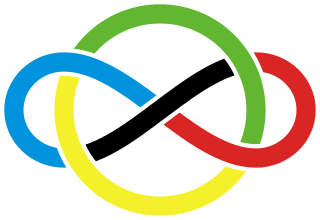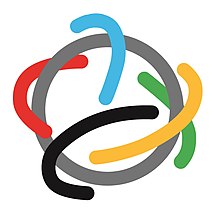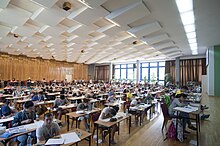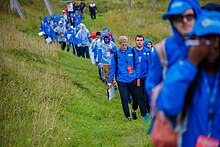
The International Olympiad in Informatics (IOI) is an annual competitive programming competition and one of the International Science Olympiads for secondary school students. The first IOI was held in 1989 in Pravetz, Bulgaria. It is the second largest science olympiad, after the International Mathematical Olympiad, in terms of number of participating countries. Each country sends a team of up to four students, plus one team leader, one deputy leader, and guests.

The International Mathematical Olympiad (IMO) is a mathematical olympiad for pre-university students, and is the oldest of the International Science Olympiads. It is “the most prestigious” mathematical competition in the world. The first IMO was held in Romania in 1959. It has since been held annually, except in 1980. More than 100 countries participate. Each country sends a team of up to six students, plus one team leader, one deputy leader, and observers.
The International Physics Olympiad (IPhO) is an annual physics competition for high school students. It is one of the International Science Olympiads. The first IPhO was held in Warsaw, Poland in 1967.

The National University of Ireland, Maynooth, commonly known as Maynooth University (MU), is a constituent university of the National University of Ireland in Maynooth, County Kildare, Ireland. It was Ireland's youngest university until Technological University Dublin was established in 2019, having been founded by the Universities Act, 1997, from the secular faculties of the now separate St Patrick's College, Maynooth, which was founded in 1795. Maynooth is also the only university town in Ireland, all other universities being based within cities.
The International Chemistry Olympiad (IChO) is an annual academic competition for high school students. It is one of the International Science Olympiads. The first IChO was held in Prague, Czechoslovakia, in 1968. The event has been held every year since then, with the exception of 1971. The delegations that attended the first events were mostly countries of the former Eastern bloc and it was not until 1980, the 12th annual International Chemistry Olympiad, that the event was held outside of the bloc in Austria. Up to 4 students for each national team compete around July in both a theoretical and an experimental sections, with about half of the participants being awarded medals.

The International Geographical Union is an international geographical society. The first International Geographical Congress was held in Antwerp in 1871. Subsequent meetings led to the establishment of the permanent organization in Brussels, Belgium, in 1922.
The Indian National Mathematical Olympiad (INMO) is a highly selective high school mathematics competition held annually in India. Since its debut in 1989, it has served as the final round of the Indian Olympiad Qualifier in Mathematics. It is the third tier in the Indian team selection procedure for the International Mathematical Olympiad and is conducted by the Homi Bhabha Centre for Science Education (HBCSE) under the aegis of the National Board for Higher Mathematics (NBHM).

The International Linguistics Olympiad (IOL) is one of the International Science Olympiads for secondary school students. Its abbreviation IOL is deliberately chosen not to correspond to the name of the organization in any particular language, and member organizations are free to choose for themselves how to designate the competition in their own language. This olympiad furthers the fields of mathematical, theoretical, and descriptive linguistics.
This article describes the selection process, by country, for entrance into the International Mathematical Olympiad.
The International Philosophy Olympiad (IPO) is an annual philosophy competition for high school students from around the world, one of the International Science Olympiads. It is organized under the auspices of the International Federation of Philosophical Societies (FISP) and supported by UNESCO.
The European Union Science Olympiad (EUSO), named European Olympiad of Experimental Science (EOES) since 2021, is a team-based science competition for the European Union's (EU) students to display their capabilities in natural sciences. The annual EUSO was founded in 2003 by Dr. Michael A. Cotter of Dublin, Ireland. It includes only EU member countries. The competition is open to second-level-school, or secondary school, science students who are 18 years of age or younger prior to the competition. Each participating country sends two three-student teams who compete in two intellectually challenging and collaborative tasks. The tasks are designed to connect the branches of science, provide relevant and inquiry-based challenges, engage all team members, support self-pacing, prompt higher-order and creative thinking, and encourage substantive communication.
The World Junior Teams Championship is a bridge competition for zonal teams of players up to about 25 years old.

The International Junior Science Olympiad (IJSO) is an annual science competition for students aged 15 and under. It is one of International Science Olympiads and an international academical competition that covers physics, chemistry and biology at the same time. The first IJSO was held in Jakarta, Indonesia in 2004. Around 70 countries send delegations of three to six students, plus one to three team leaders, and observers.

The International Earth Science Olympiad (IESO), one of the thirteen International Science Olympiads, is an annual competition for secondary school students that tests their abilities in disciplines such as geology, meteorology, environmental science, and terrestrial astronomy. Students who are winners of the respective national competitions are invited to participate in the IESO, and all interested countries are encouraged to contribute to the IESO. The IESO is one of the only three International Science Olympiads to include an International Team Competition.
The North American Computational Linguistics Open competition (NACLO), formerly called the North American Computational Linguistics Olympiad before January 1, 2020, is a computational linguistics competition for high school students in the United States and Canada that has been held since 2007. For the 2021 Open competition, approximately 1300 to 1400 students competed. Since 2008 the contest has consisted of two rounds, the second being administered to the top scorers in the first round. The top-scoring students on the second round qualify for the International Linguistics Olympiad (IOL), one of the international science olympiads.
The Asian Physics Olympiad (APhO) is an annual physics competition for high school students from Asia and Oceania regions. It is one of the International Science Olympiads. It was initiated in the year of 2000 by Indonesia. The first APhO was hosted by Indonesia in 2000.

National Science Talent Contest or NSTC is an extension of the National Physics Talent Contest launched by PIEAS in 1995 on the directive of the then President of Pakistan. The purpose of the NSTC is to inspire the youth of the Nation to opt for careers in science, and mathematics and to prepare young students for participation in International Science Olympiads in Physics, Biology, Chemistry and Mathematics.
The United Kingdom Linguistics Olympiad (UKLO) is a linguistics competition for primary and secondary school students in the United Kingdom. The competition is divided into four levels: Breakthrough, Foundation, Intermediate and Advanced, collectively known as 'Round 1', with the top-scoring 5% of entrants at Advanced level eligible for a follow-on round, called 'Round 2' and selection for participation in the International Linguistics Olympiad, one of the international science olympiads. In 2009, teams from two schools competed in a pilot competition, with the winners taking part in the international contest as guests of the All-Ireland Linguistics Olympiad. In 2010, an independent olympiad was created and has taken place every year since.














